Analysis of Ethical Dilemma in Healthcare: Harry Nelson's Case Study
VerifiedAdded on 2020/01/23
|10
|2862
|69
Case Study
AI Summary
This case study presents an ethical dilemma concerning Harry Nelson, a cancer patient facing end-of-life care. The core conflict arises from Harry's desire to die at home versus the palliative care team's recommendation for admission to a care home. The analysis explores ethical principles like beneficence, non-maleficence, respect for autonomy, and fairness, along with the application of the Code of Ethics for Nurses in Australia and professional codes of conduct. The study emphasizes the importance of patient consent, nurses' responsibilities, and the balance between legal and ethical considerations. It examines how ethical theories, particularly deontology, can inform decision-making in such complex situations, highlighting the need for nurses to uphold patients' rights while ensuring quality care. The conclusion stresses the need for ethical and professional values in healthcare to promote patient well-being and informed decision-making, including the involvement of family members in the care process.
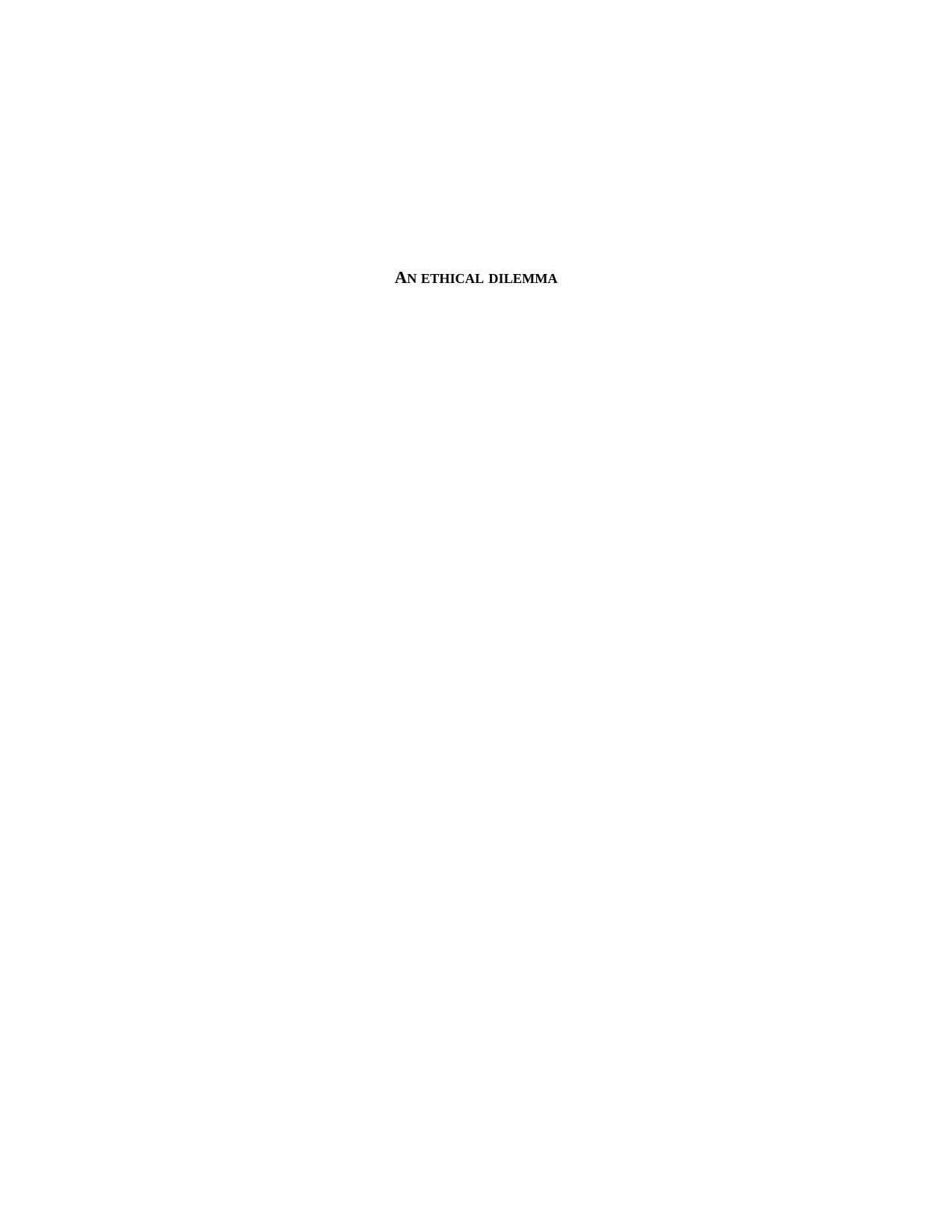
AN ETHICAL DILEMMA
Paraphrase This Document
Need a fresh take? Get an instant paraphrase of this document with our AI Paraphraser
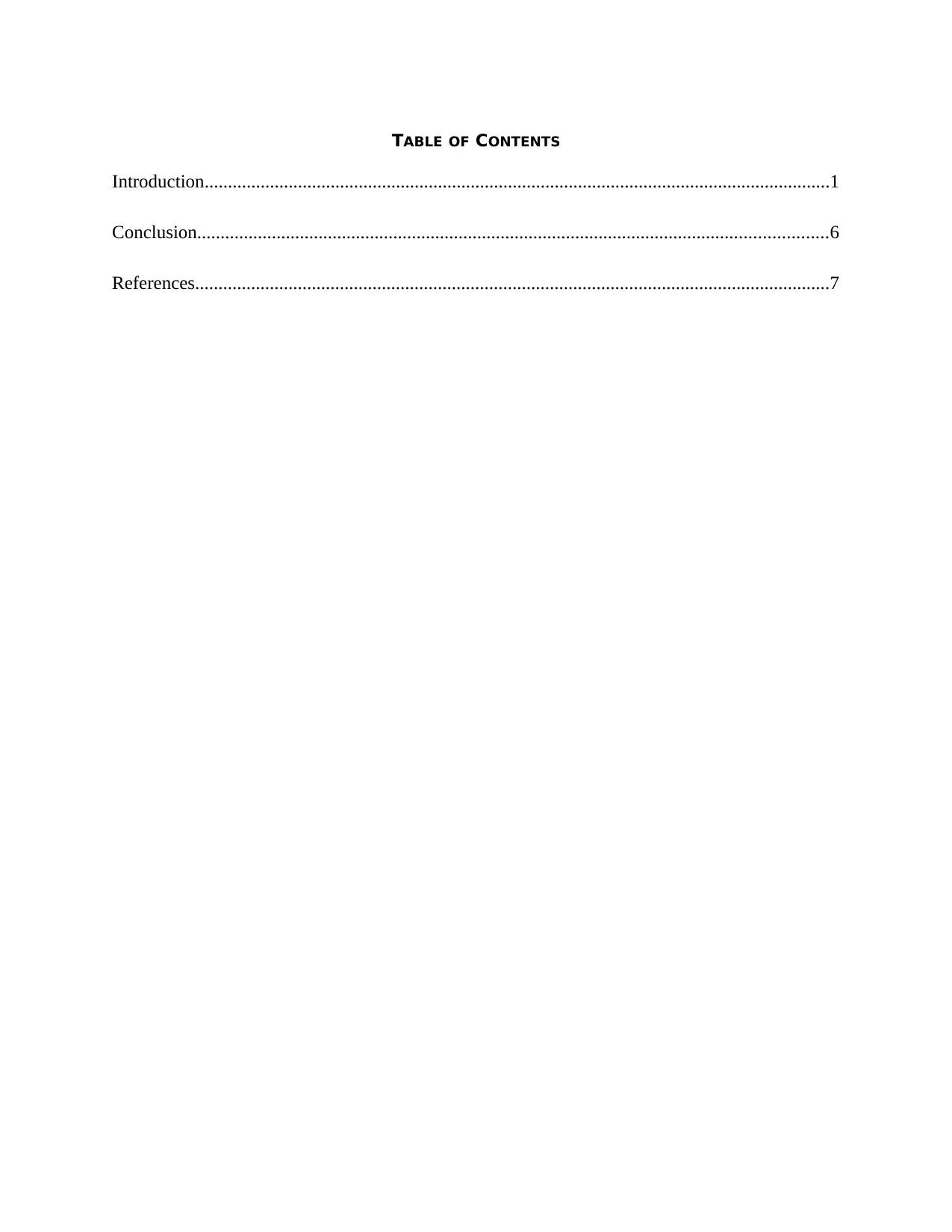
TABLE OF CONTENTS
Introduction......................................................................................................................................1
Conclusion.......................................................................................................................................6
References........................................................................................................................................7
Introduction......................................................................................................................................1
Conclusion.......................................................................................................................................6
References........................................................................................................................................7
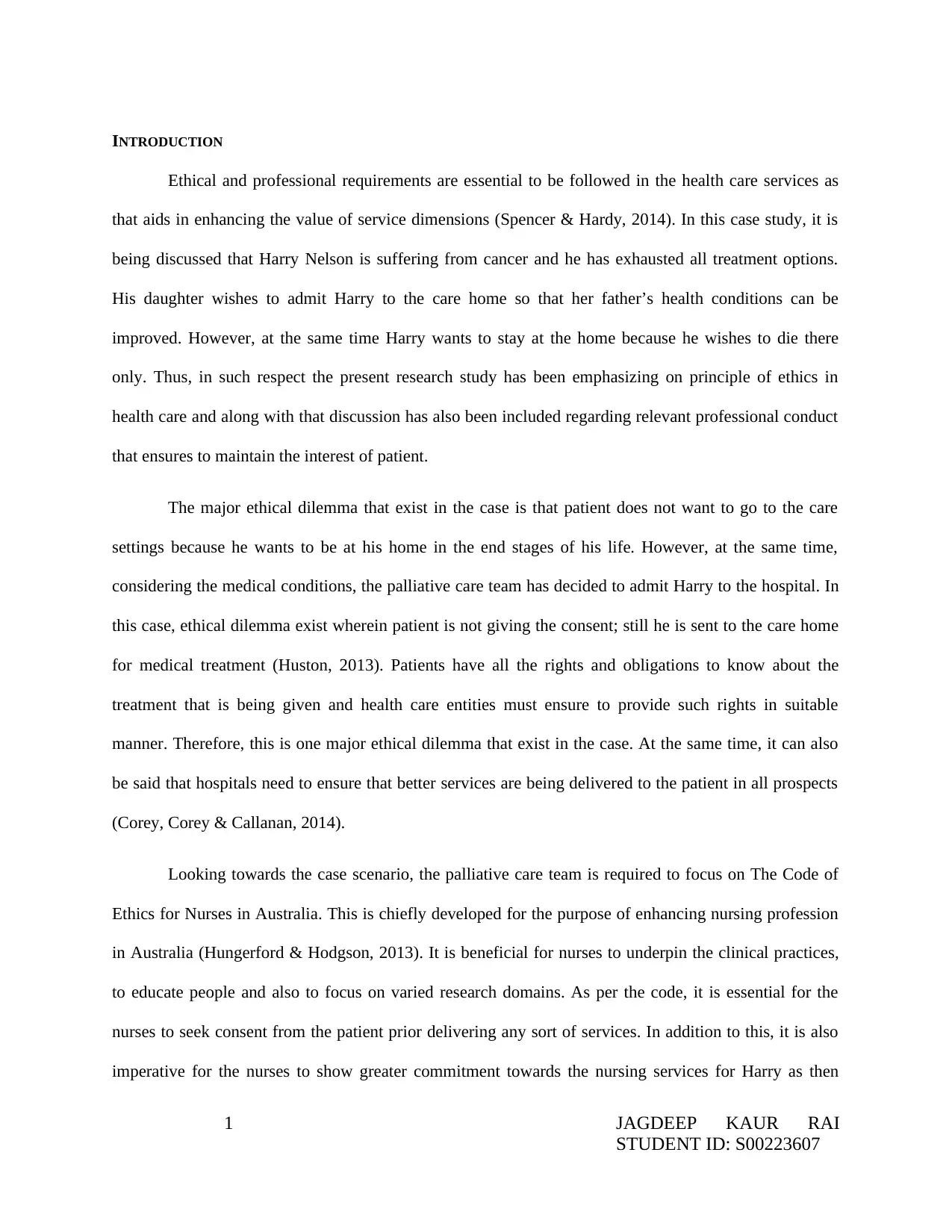
INTRODUCTION
Ethical and professional requirements are essential to be followed in the health care services as
that aids in enhancing the value of service dimensions (Spencer & Hardy, 2014). In this case study, it is
being discussed that Harry Nelson is suffering from cancer and he has exhausted all treatment options.
His daughter wishes to admit Harry to the care home so that her father’s health conditions can be
improved. However, at the same time Harry wants to stay at the home because he wishes to die there
only. Thus, in such respect the present research study has been emphasizing on principle of ethics in
health care and along with that discussion has also been included regarding relevant professional conduct
that ensures to maintain the interest of patient.
The major ethical dilemma that exist in the case is that patient does not want to go to the care
settings because he wants to be at his home in the end stages of his life. However, at the same time,
considering the medical conditions, the palliative care team has decided to admit Harry to the hospital. In
this case, ethical dilemma exist wherein patient is not giving the consent; still he is sent to the care home
for medical treatment (Huston, 2013). Patients have all the rights and obligations to know about the
treatment that is being given and health care entities must ensure to provide such rights in suitable
manner. Therefore, this is one major ethical dilemma that exist in the case. At the same time, it can also
be said that hospitals need to ensure that better services are being delivered to the patient in all prospects
(Corey, Corey & Callanan, 2014).
Looking towards the case scenario, the palliative care team is required to focus on The Code of
Ethics for Nurses in Australia. This is chiefly developed for the purpose of enhancing nursing profession
in Australia (Hungerford & Hodgson, 2013). It is beneficial for nurses to underpin the clinical practices,
to educate people and also to focus on varied research domains. As per the code, it is essential for the
nurses to seek consent from the patient prior delivering any sort of services. In addition to this, it is also
imperative for the nurses to show greater commitment towards the nursing services for Harry as then
1 JAGDEEP KAUR RAI
STUDENT ID: S00223607
Ethical and professional requirements are essential to be followed in the health care services as
that aids in enhancing the value of service dimensions (Spencer & Hardy, 2014). In this case study, it is
being discussed that Harry Nelson is suffering from cancer and he has exhausted all treatment options.
His daughter wishes to admit Harry to the care home so that her father’s health conditions can be
improved. However, at the same time Harry wants to stay at the home because he wishes to die there
only. Thus, in such respect the present research study has been emphasizing on principle of ethics in
health care and along with that discussion has also been included regarding relevant professional conduct
that ensures to maintain the interest of patient.
The major ethical dilemma that exist in the case is that patient does not want to go to the care
settings because he wants to be at his home in the end stages of his life. However, at the same time,
considering the medical conditions, the palliative care team has decided to admit Harry to the hospital. In
this case, ethical dilemma exist wherein patient is not giving the consent; still he is sent to the care home
for medical treatment (Huston, 2013). Patients have all the rights and obligations to know about the
treatment that is being given and health care entities must ensure to provide such rights in suitable
manner. Therefore, this is one major ethical dilemma that exist in the case. At the same time, it can also
be said that hospitals need to ensure that better services are being delivered to the patient in all prospects
(Corey, Corey & Callanan, 2014).
Looking towards the case scenario, the palliative care team is required to focus on The Code of
Ethics for Nurses in Australia. This is chiefly developed for the purpose of enhancing nursing profession
in Australia (Hungerford & Hodgson, 2013). It is beneficial for nurses to underpin the clinical practices,
to educate people and also to focus on varied research domains. As per the code, it is essential for the
nurses to seek consent from the patient prior delivering any sort of services. In addition to this, it is also
imperative for the nurses to show greater commitment towards the nursing services for Harry as then
1 JAGDEEP KAUR RAI
STUDENT ID: S00223607
⊘ This is a preview!⊘
Do you want full access?
Subscribe today to unlock all pages.

Trusted by 1+ million students worldwide
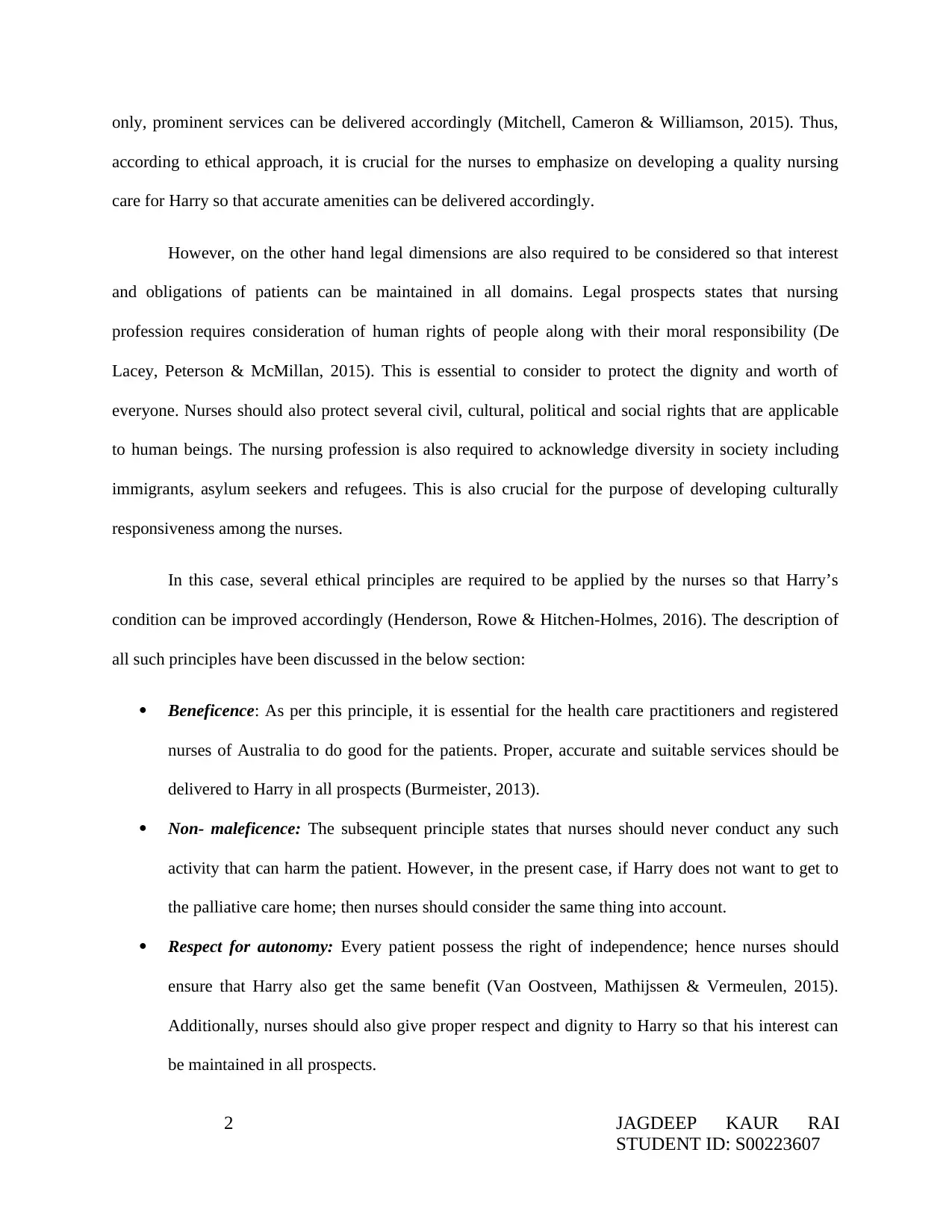
only, prominent services can be delivered accordingly (Mitchell, Cameron & Williamson, 2015). Thus,
according to ethical approach, it is crucial for the nurses to emphasize on developing a quality nursing
care for Harry so that accurate amenities can be delivered accordingly.
However, on the other hand legal dimensions are also required to be considered so that interest
and obligations of patients can be maintained in all domains. Legal prospects states that nursing
profession requires consideration of human rights of people along with their moral responsibility (De
Lacey, Peterson & McMillan, 2015). This is essential to consider to protect the dignity and worth of
everyone. Nurses should also protect several civil, cultural, political and social rights that are applicable
to human beings. The nursing profession is also required to acknowledge diversity in society including
immigrants, asylum seekers and refugees. This is also crucial for the purpose of developing culturally
responsiveness among the nurses.
In this case, several ethical principles are required to be applied by the nurses so that Harry’s
condition can be improved accordingly (Henderson, Rowe & Hitchen-Holmes, 2016). The description of
all such principles have been discussed in the below section:
Beneficence: As per this principle, it is essential for the health care practitioners and registered
nurses of Australia to do good for the patients. Proper, accurate and suitable services should be
delivered to Harry in all prospects (Burmeister, 2013).
Non- maleficence: The subsequent principle states that nurses should never conduct any such
activity that can harm the patient. However, in the present case, if Harry does not want to get to
the palliative care home; then nurses should consider the same thing into account.
Respect for autonomy: Every patient possess the right of independence; hence nurses should
ensure that Harry also get the same benefit (Van Oostveen, Mathijssen & Vermeulen, 2015).
Additionally, nurses should also give proper respect and dignity to Harry so that his interest can
be maintained in all prospects.
2 JAGDEEP KAUR RAI
STUDENT ID: S00223607
according to ethical approach, it is crucial for the nurses to emphasize on developing a quality nursing
care for Harry so that accurate amenities can be delivered accordingly.
However, on the other hand legal dimensions are also required to be considered so that interest
and obligations of patients can be maintained in all domains. Legal prospects states that nursing
profession requires consideration of human rights of people along with their moral responsibility (De
Lacey, Peterson & McMillan, 2015). This is essential to consider to protect the dignity and worth of
everyone. Nurses should also protect several civil, cultural, political and social rights that are applicable
to human beings. The nursing profession is also required to acknowledge diversity in society including
immigrants, asylum seekers and refugees. This is also crucial for the purpose of developing culturally
responsiveness among the nurses.
In this case, several ethical principles are required to be applied by the nurses so that Harry’s
condition can be improved accordingly (Henderson, Rowe & Hitchen-Holmes, 2016). The description of
all such principles have been discussed in the below section:
Beneficence: As per this principle, it is essential for the health care practitioners and registered
nurses of Australia to do good for the patients. Proper, accurate and suitable services should be
delivered to Harry in all prospects (Burmeister, 2013).
Non- maleficence: The subsequent principle states that nurses should never conduct any such
activity that can harm the patient. However, in the present case, if Harry does not want to get to
the palliative care home; then nurses should consider the same thing into account.
Respect for autonomy: Every patient possess the right of independence; hence nurses should
ensure that Harry also get the same benefit (Van Oostveen, Mathijssen & Vermeulen, 2015).
Additionally, nurses should also give proper respect and dignity to Harry so that his interest can
be maintained in all prospects.
2 JAGDEEP KAUR RAI
STUDENT ID: S00223607
Paraphrase This Document
Need a fresh take? Get an instant paraphrase of this document with our AI Paraphraser
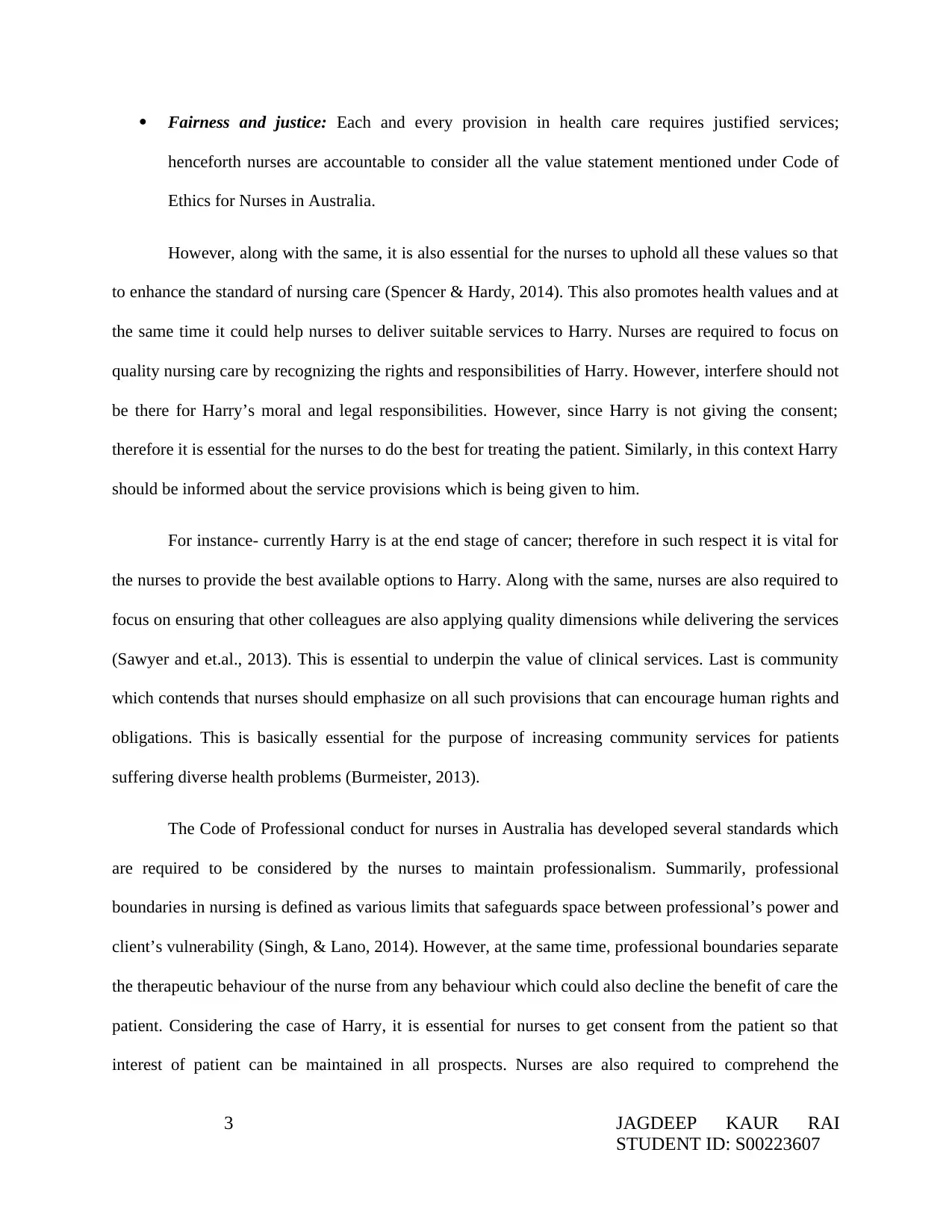
Fairness and justice: Each and every provision in health care requires justified services;
henceforth nurses are accountable to consider all the value statement mentioned under Code of
Ethics for Nurses in Australia.
However, along with the same, it is also essential for the nurses to uphold all these values so that
to enhance the standard of nursing care (Spencer & Hardy, 2014). This also promotes health values and at
the same time it could help nurses to deliver suitable services to Harry. Nurses are required to focus on
quality nursing care by recognizing the rights and responsibilities of Harry. However, interfere should not
be there for Harry’s moral and legal responsibilities. However, since Harry is not giving the consent;
therefore it is essential for the nurses to do the best for treating the patient. Similarly, in this context Harry
should be informed about the service provisions which is being given to him.
For instance- currently Harry is at the end stage of cancer; therefore in such respect it is vital for
the nurses to provide the best available options to Harry. Along with the same, nurses are also required to
focus on ensuring that other colleagues are also applying quality dimensions while delivering the services
(Sawyer and et.al., 2013). This is essential to underpin the value of clinical services. Last is community
which contends that nurses should emphasize on all such provisions that can encourage human rights and
obligations. This is basically essential for the purpose of increasing community services for patients
suffering diverse health problems (Burmeister, 2013).
The Code of Professional conduct for nurses in Australia has developed several standards which
are required to be considered by the nurses to maintain professionalism. Summarily, professional
boundaries in nursing is defined as various limits that safeguards space between professional’s power and
client’s vulnerability (Singh, & Lano, 2014). However, at the same time, professional boundaries separate
the therapeutic behaviour of the nurse from any behaviour which could also decline the benefit of care the
patient. Considering the case of Harry, it is essential for nurses to get consent from the patient so that
interest of patient can be maintained in all prospects. Nurses are also required to comprehend the
3 JAGDEEP KAUR RAI
STUDENT ID: S00223607
henceforth nurses are accountable to consider all the value statement mentioned under Code of
Ethics for Nurses in Australia.
However, along with the same, it is also essential for the nurses to uphold all these values so that
to enhance the standard of nursing care (Spencer & Hardy, 2014). This also promotes health values and at
the same time it could help nurses to deliver suitable services to Harry. Nurses are required to focus on
quality nursing care by recognizing the rights and responsibilities of Harry. However, interfere should not
be there for Harry’s moral and legal responsibilities. However, since Harry is not giving the consent;
therefore it is essential for the nurses to do the best for treating the patient. Similarly, in this context Harry
should be informed about the service provisions which is being given to him.
For instance- currently Harry is at the end stage of cancer; therefore in such respect it is vital for
the nurses to provide the best available options to Harry. Along with the same, nurses are also required to
focus on ensuring that other colleagues are also applying quality dimensions while delivering the services
(Sawyer and et.al., 2013). This is essential to underpin the value of clinical services. Last is community
which contends that nurses should emphasize on all such provisions that can encourage human rights and
obligations. This is basically essential for the purpose of increasing community services for patients
suffering diverse health problems (Burmeister, 2013).
The Code of Professional conduct for nurses in Australia has developed several standards which
are required to be considered by the nurses to maintain professionalism. Summarily, professional
boundaries in nursing is defined as various limits that safeguards space between professional’s power and
client’s vulnerability (Singh, & Lano, 2014). However, at the same time, professional boundaries separate
the therapeutic behaviour of the nurse from any behaviour which could also decline the benefit of care the
patient. Considering the case of Harry, it is essential for nurses to get consent from the patient so that
interest of patient can be maintained in all prospects. Nurses are also required to comprehend the
3 JAGDEEP KAUR RAI
STUDENT ID: S00223607
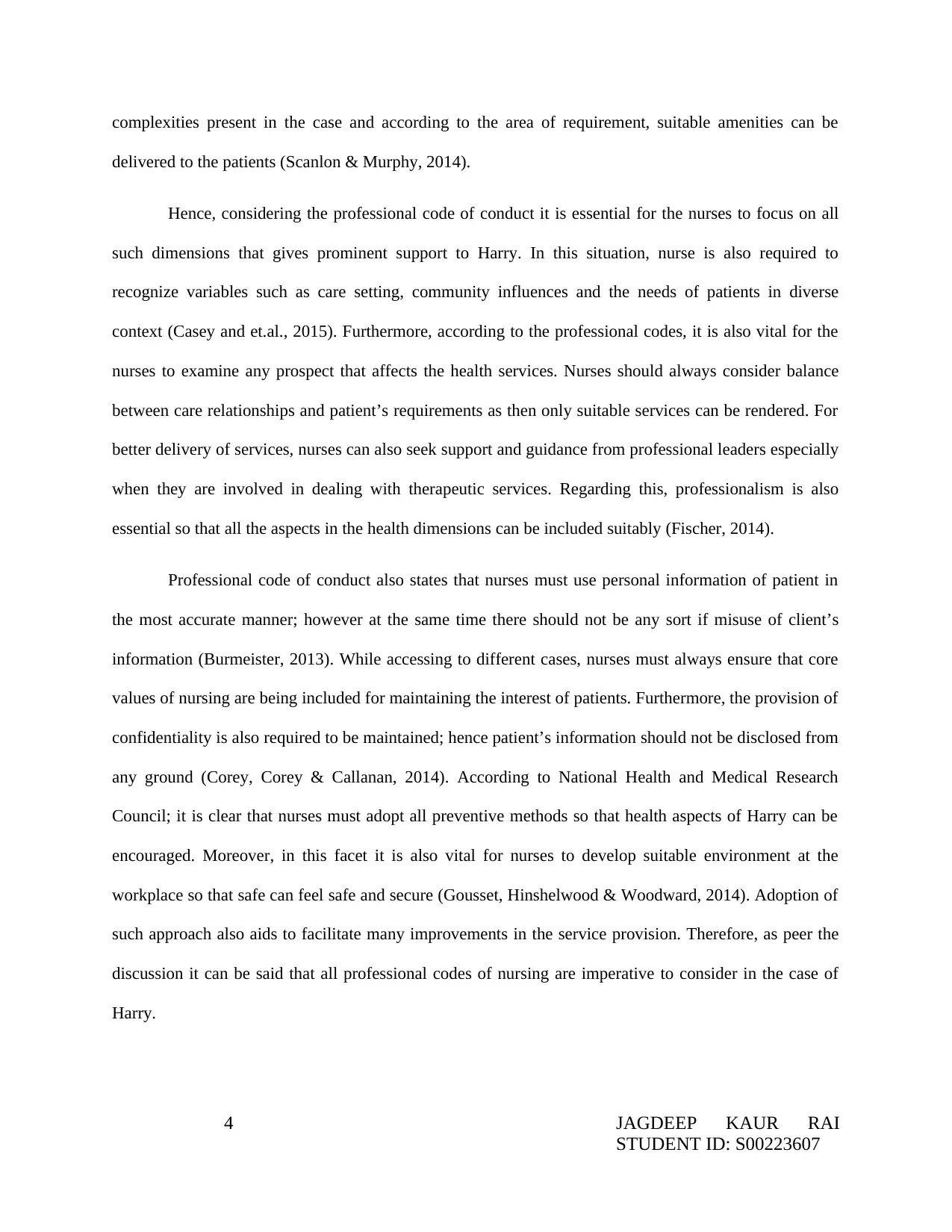
complexities present in the case and according to the area of requirement, suitable amenities can be
delivered to the patients (Scanlon & Murphy, 2014).
Hence, considering the professional code of conduct it is essential for the nurses to focus on all
such dimensions that gives prominent support to Harry. In this situation, nurse is also required to
recognize variables such as care setting, community influences and the needs of patients in diverse
context (Casey and et.al., 2015). Furthermore, according to the professional codes, it is also vital for the
nurses to examine any prospect that affects the health services. Nurses should always consider balance
between care relationships and patient’s requirements as then only suitable services can be rendered. For
better delivery of services, nurses can also seek support and guidance from professional leaders especially
when they are involved in dealing with therapeutic services. Regarding this, professionalism is also
essential so that all the aspects in the health dimensions can be included suitably (Fischer, 2014).
Professional code of conduct also states that nurses must use personal information of patient in
the most accurate manner; however at the same time there should not be any sort if misuse of client’s
information (Burmeister, 2013). While accessing to different cases, nurses must always ensure that core
values of nursing are being included for maintaining the interest of patients. Furthermore, the provision of
confidentiality is also required to be maintained; hence patient’s information should not be disclosed from
any ground (Corey, Corey & Callanan, 2014). According to National Health and Medical Research
Council; it is clear that nurses must adopt all preventive methods so that health aspects of Harry can be
encouraged. Moreover, in this facet it is also vital for nurses to develop suitable environment at the
workplace so that safe can feel safe and secure (Gousset, Hinshelwood & Woodward, 2014). Adoption of
such approach also aids to facilitate many improvements in the service provision. Therefore, as peer the
discussion it can be said that all professional codes of nursing are imperative to consider in the case of
Harry.
4 JAGDEEP KAUR RAI
STUDENT ID: S00223607
delivered to the patients (Scanlon & Murphy, 2014).
Hence, considering the professional code of conduct it is essential for the nurses to focus on all
such dimensions that gives prominent support to Harry. In this situation, nurse is also required to
recognize variables such as care setting, community influences and the needs of patients in diverse
context (Casey and et.al., 2015). Furthermore, according to the professional codes, it is also vital for the
nurses to examine any prospect that affects the health services. Nurses should always consider balance
between care relationships and patient’s requirements as then only suitable services can be rendered. For
better delivery of services, nurses can also seek support and guidance from professional leaders especially
when they are involved in dealing with therapeutic services. Regarding this, professionalism is also
essential so that all the aspects in the health dimensions can be included suitably (Fischer, 2014).
Professional code of conduct also states that nurses must use personal information of patient in
the most accurate manner; however at the same time there should not be any sort if misuse of client’s
information (Burmeister, 2013). While accessing to different cases, nurses must always ensure that core
values of nursing are being included for maintaining the interest of patients. Furthermore, the provision of
confidentiality is also required to be maintained; hence patient’s information should not be disclosed from
any ground (Corey, Corey & Callanan, 2014). According to National Health and Medical Research
Council; it is clear that nurses must adopt all preventive methods so that health aspects of Harry can be
encouraged. Moreover, in this facet it is also vital for nurses to develop suitable environment at the
workplace so that safe can feel safe and secure (Gousset, Hinshelwood & Woodward, 2014). Adoption of
such approach also aids to facilitate many improvements in the service provision. Therefore, as peer the
discussion it can be said that all professional codes of nursing are imperative to consider in the case of
Harry.
4 JAGDEEP KAUR RAI
STUDENT ID: S00223607
⊘ This is a preview!⊘
Do you want full access?
Subscribe today to unlock all pages.

Trusted by 1+ million students worldwide
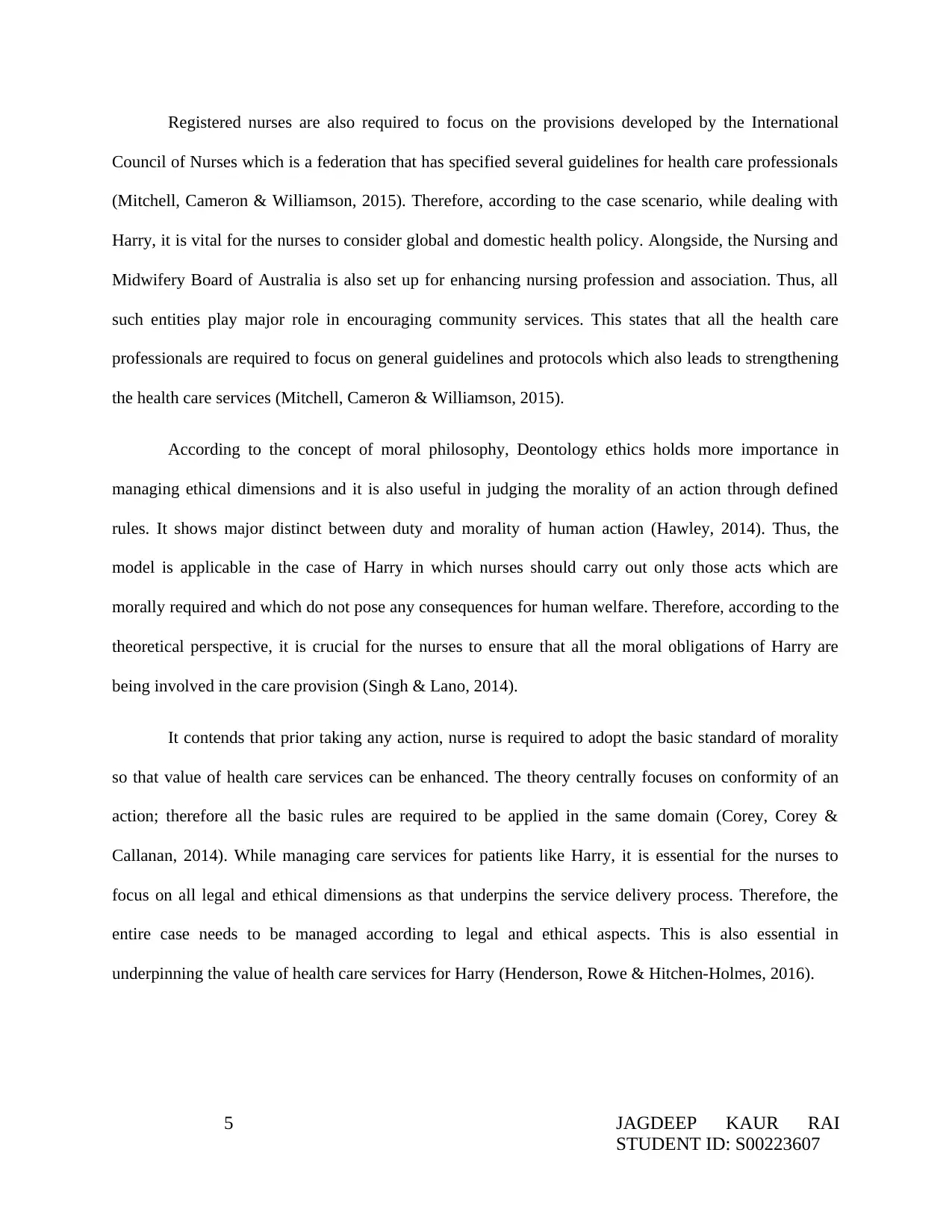
Registered nurses are also required to focus on the provisions developed by the International
Council of Nurses which is a federation that has specified several guidelines for health care professionals
(Mitchell, Cameron & Williamson, 2015). Therefore, according to the case scenario, while dealing with
Harry, it is vital for the nurses to consider global and domestic health policy. Alongside, the Nursing and
Midwifery Board of Australia is also set up for enhancing nursing profession and association. Thus, all
such entities play major role in encouraging community services. This states that all the health care
professionals are required to focus on general guidelines and protocols which also leads to strengthening
the health care services (Mitchell, Cameron & Williamson, 2015).
According to the concept of moral philosophy, Deontology ethics holds more importance in
managing ethical dimensions and it is also useful in judging the morality of an action through defined
rules. It shows major distinct between duty and morality of human action (Hawley, 2014). Thus, the
model is applicable in the case of Harry in which nurses should carry out only those acts which are
morally required and which do not pose any consequences for human welfare. Therefore, according to the
theoretical perspective, it is crucial for the nurses to ensure that all the moral obligations of Harry are
being involved in the care provision (Singh & Lano, 2014).
It contends that prior taking any action, nurse is required to adopt the basic standard of morality
so that value of health care services can be enhanced. The theory centrally focuses on conformity of an
action; therefore all the basic rules are required to be applied in the same domain (Corey, Corey &
Callanan, 2014). While managing care services for patients like Harry, it is essential for the nurses to
focus on all legal and ethical dimensions as that underpins the service delivery process. Therefore, the
entire case needs to be managed according to legal and ethical aspects. This is also essential in
underpinning the value of health care services for Harry (Henderson, Rowe & Hitchen-Holmes, 2016).
5 JAGDEEP KAUR RAI
STUDENT ID: S00223607
Council of Nurses which is a federation that has specified several guidelines for health care professionals
(Mitchell, Cameron & Williamson, 2015). Therefore, according to the case scenario, while dealing with
Harry, it is vital for the nurses to consider global and domestic health policy. Alongside, the Nursing and
Midwifery Board of Australia is also set up for enhancing nursing profession and association. Thus, all
such entities play major role in encouraging community services. This states that all the health care
professionals are required to focus on general guidelines and protocols which also leads to strengthening
the health care services (Mitchell, Cameron & Williamson, 2015).
According to the concept of moral philosophy, Deontology ethics holds more importance in
managing ethical dimensions and it is also useful in judging the morality of an action through defined
rules. It shows major distinct between duty and morality of human action (Hawley, 2014). Thus, the
model is applicable in the case of Harry in which nurses should carry out only those acts which are
morally required and which do not pose any consequences for human welfare. Therefore, according to the
theoretical perspective, it is crucial for the nurses to ensure that all the moral obligations of Harry are
being involved in the care provision (Singh & Lano, 2014).
It contends that prior taking any action, nurse is required to adopt the basic standard of morality
so that value of health care services can be enhanced. The theory centrally focuses on conformity of an
action; therefore all the basic rules are required to be applied in the same domain (Corey, Corey &
Callanan, 2014). While managing care services for patients like Harry, it is essential for the nurses to
focus on all legal and ethical dimensions as that underpins the service delivery process. Therefore, the
entire case needs to be managed according to legal and ethical aspects. This is also essential in
underpinning the value of health care services for Harry (Henderson, Rowe & Hitchen-Holmes, 2016).
5 JAGDEEP KAUR RAI
STUDENT ID: S00223607
Paraphrase This Document
Need a fresh take? Get an instant paraphrase of this document with our AI Paraphraser
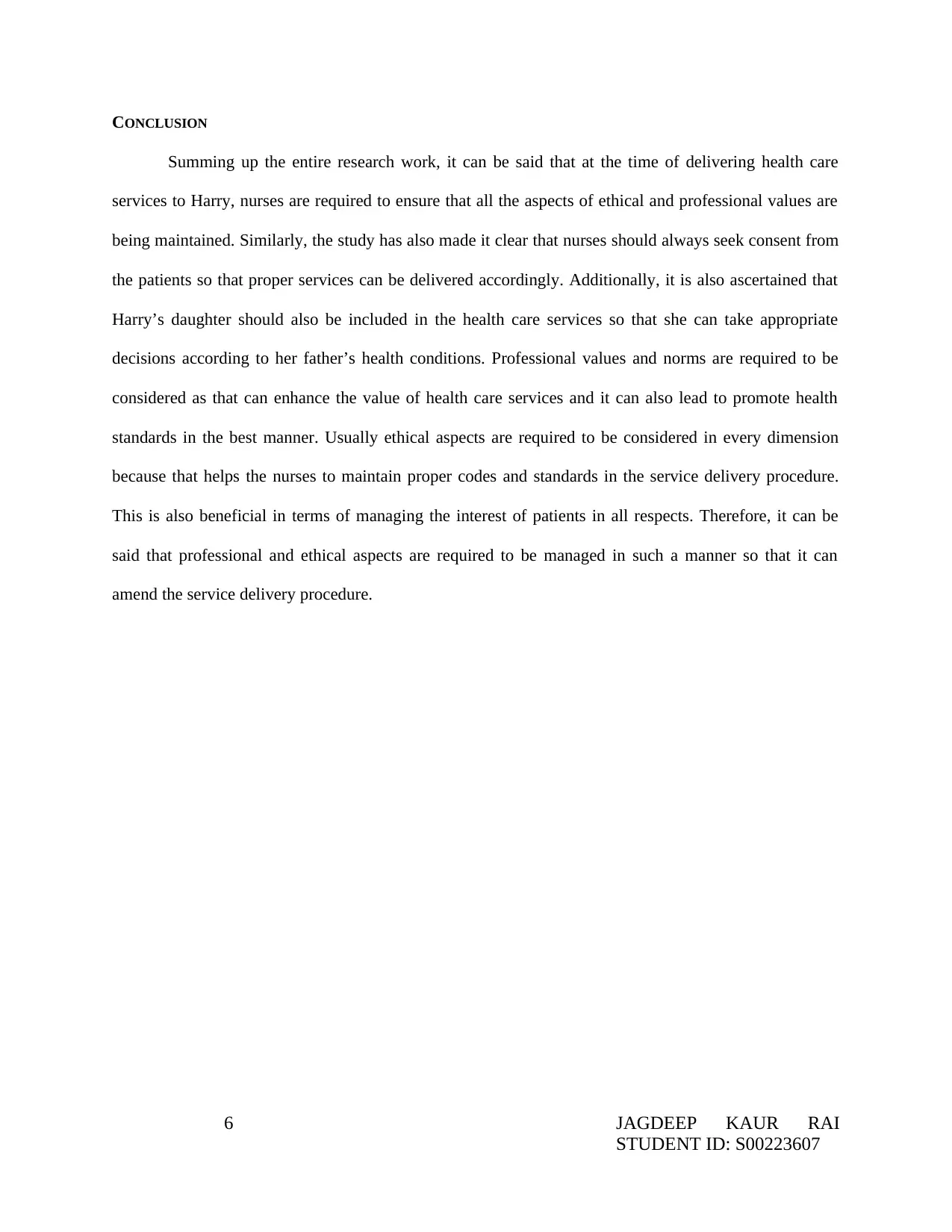
CONCLUSION
Summing up the entire research work, it can be said that at the time of delivering health care
services to Harry, nurses are required to ensure that all the aspects of ethical and professional values are
being maintained. Similarly, the study has also made it clear that nurses should always seek consent from
the patients so that proper services can be delivered accordingly. Additionally, it is also ascertained that
Harry’s daughter should also be included in the health care services so that she can take appropriate
decisions according to her father’s health conditions. Professional values and norms are required to be
considered as that can enhance the value of health care services and it can also lead to promote health
standards in the best manner. Usually ethical aspects are required to be considered in every dimension
because that helps the nurses to maintain proper codes and standards in the service delivery procedure.
This is also beneficial in terms of managing the interest of patients in all respects. Therefore, it can be
said that professional and ethical aspects are required to be managed in such a manner so that it can
amend the service delivery procedure.
6 JAGDEEP KAUR RAI
STUDENT ID: S00223607
Summing up the entire research work, it can be said that at the time of delivering health care
services to Harry, nurses are required to ensure that all the aspects of ethical and professional values are
being maintained. Similarly, the study has also made it clear that nurses should always seek consent from
the patients so that proper services can be delivered accordingly. Additionally, it is also ascertained that
Harry’s daughter should also be included in the health care services so that she can take appropriate
decisions according to her father’s health conditions. Professional values and norms are required to be
considered as that can enhance the value of health care services and it can also lead to promote health
standards in the best manner. Usually ethical aspects are required to be considered in every dimension
because that helps the nurses to maintain proper codes and standards in the service delivery procedure.
This is also beneficial in terms of managing the interest of patients in all respects. Therefore, it can be
said that professional and ethical aspects are required to be managed in such a manner so that it can
amend the service delivery procedure.
6 JAGDEEP KAUR RAI
STUDENT ID: S00223607
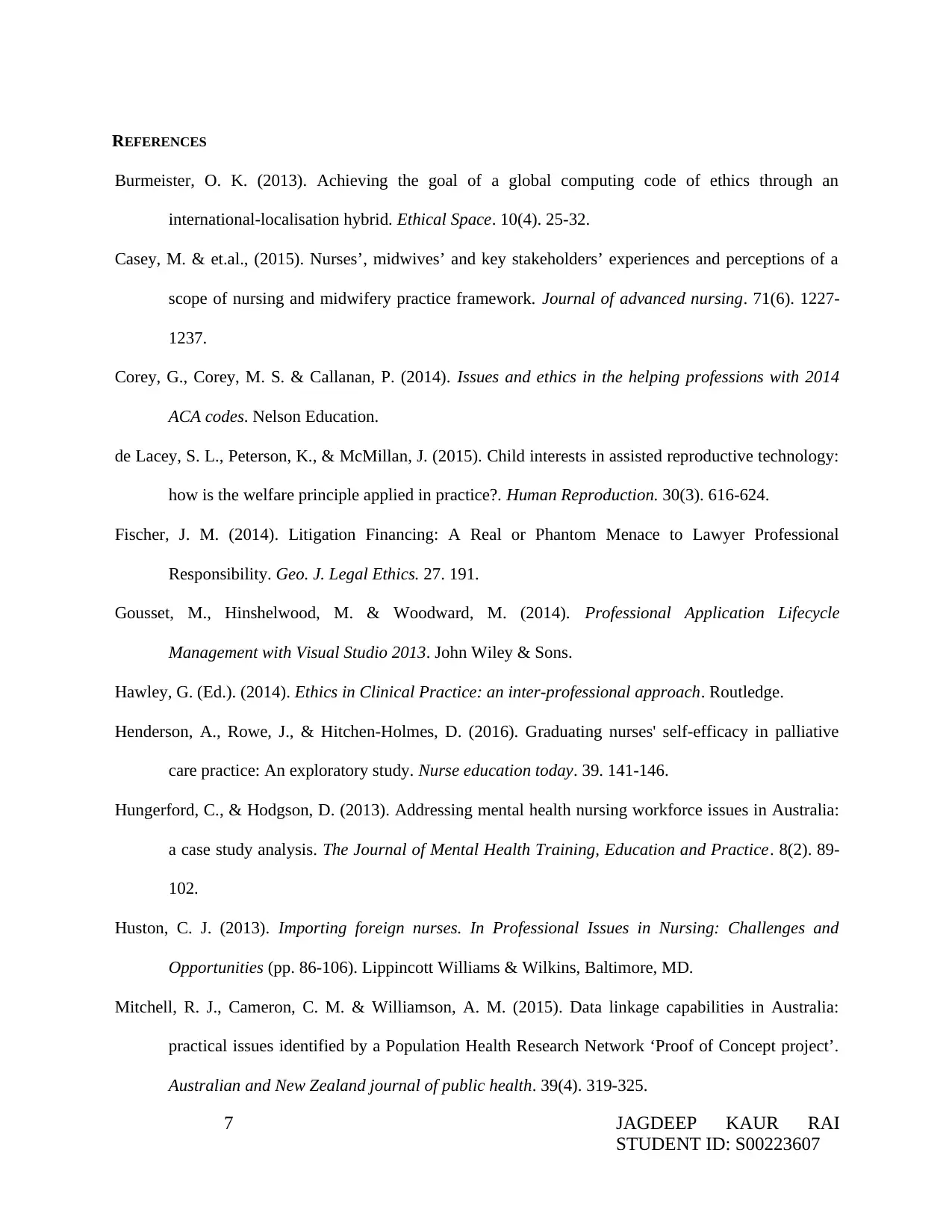
REFERENCES
Burmeister, O. K. (2013). Achieving the goal of a global computing code of ethics through an
international-localisation hybrid. Ethical Space. 10(4). 25-32.
Casey, M. & et.al., (2015). Nurses’, midwives’ and key stakeholders’ experiences and perceptions of a
scope of nursing and midwifery practice framework. Journal of advanced nursing. 71(6). 1227-
1237.
Corey, G., Corey, M. S. & Callanan, P. (2014). Issues and ethics in the helping professions with 2014
ACA codes. Nelson Education.
de Lacey, S. L., Peterson, K., & McMillan, J. (2015). Child interests in assisted reproductive technology:
how is the welfare principle applied in practice?. Human Reproduction. 30(3). 616-624.
Fischer, J. M. (2014). Litigation Financing: A Real or Phantom Menace to Lawyer Professional
Responsibility. Geo. J. Legal Ethics. 27. 191.
Gousset, M., Hinshelwood, M. & Woodward, M. (2014). Professional Application Lifecycle
Management with Visual Studio 2013. John Wiley & Sons.
Hawley, G. (Ed.). (2014). Ethics in Clinical Practice: an inter-professional approach. Routledge.
Henderson, A., Rowe, J., & Hitchen-Holmes, D. (2016). Graduating nurses' self-efficacy in palliative
care practice: An exploratory study. Nurse education today. 39. 141-146.
Hungerford, C., & Hodgson, D. (2013). Addressing mental health nursing workforce issues in Australia:
a case study analysis. The Journal of Mental Health Training, Education and Practice. 8(2). 89-
102.
Huston, C. J. (2013). Importing foreign nurses. In Professional Issues in Nursing: Challenges and
Opportunities (pp. 86-106). Lippincott Williams & Wilkins, Baltimore, MD.
Mitchell, R. J., Cameron, C. M. & Williamson, A. M. (2015). Data linkage capabilities in Australia:
practical issues identified by a Population Health Research Network ‘Proof of Concept project’.
Australian and New Zealand journal of public health. 39(4). 319-325.
7 JAGDEEP KAUR RAI
STUDENT ID: S00223607
Burmeister, O. K. (2013). Achieving the goal of a global computing code of ethics through an
international-localisation hybrid. Ethical Space. 10(4). 25-32.
Casey, M. & et.al., (2015). Nurses’, midwives’ and key stakeholders’ experiences and perceptions of a
scope of nursing and midwifery practice framework. Journal of advanced nursing. 71(6). 1227-
1237.
Corey, G., Corey, M. S. & Callanan, P. (2014). Issues and ethics in the helping professions with 2014
ACA codes. Nelson Education.
de Lacey, S. L., Peterson, K., & McMillan, J. (2015). Child interests in assisted reproductive technology:
how is the welfare principle applied in practice?. Human Reproduction. 30(3). 616-624.
Fischer, J. M. (2014). Litigation Financing: A Real or Phantom Menace to Lawyer Professional
Responsibility. Geo. J. Legal Ethics. 27. 191.
Gousset, M., Hinshelwood, M. & Woodward, M. (2014). Professional Application Lifecycle
Management with Visual Studio 2013. John Wiley & Sons.
Hawley, G. (Ed.). (2014). Ethics in Clinical Practice: an inter-professional approach. Routledge.
Henderson, A., Rowe, J., & Hitchen-Holmes, D. (2016). Graduating nurses' self-efficacy in palliative
care practice: An exploratory study. Nurse education today. 39. 141-146.
Hungerford, C., & Hodgson, D. (2013). Addressing mental health nursing workforce issues in Australia:
a case study analysis. The Journal of Mental Health Training, Education and Practice. 8(2). 89-
102.
Huston, C. J. (2013). Importing foreign nurses. In Professional Issues in Nursing: Challenges and
Opportunities (pp. 86-106). Lippincott Williams & Wilkins, Baltimore, MD.
Mitchell, R. J., Cameron, C. M. & Williamson, A. M. (2015). Data linkage capabilities in Australia:
practical issues identified by a Population Health Research Network ‘Proof of Concept project’.
Australian and New Zealand journal of public health. 39(4). 319-325.
7 JAGDEEP KAUR RAI
STUDENT ID: S00223607
⊘ This is a preview!⊘
Do you want full access?
Subscribe today to unlock all pages.

Trusted by 1+ million students worldwide
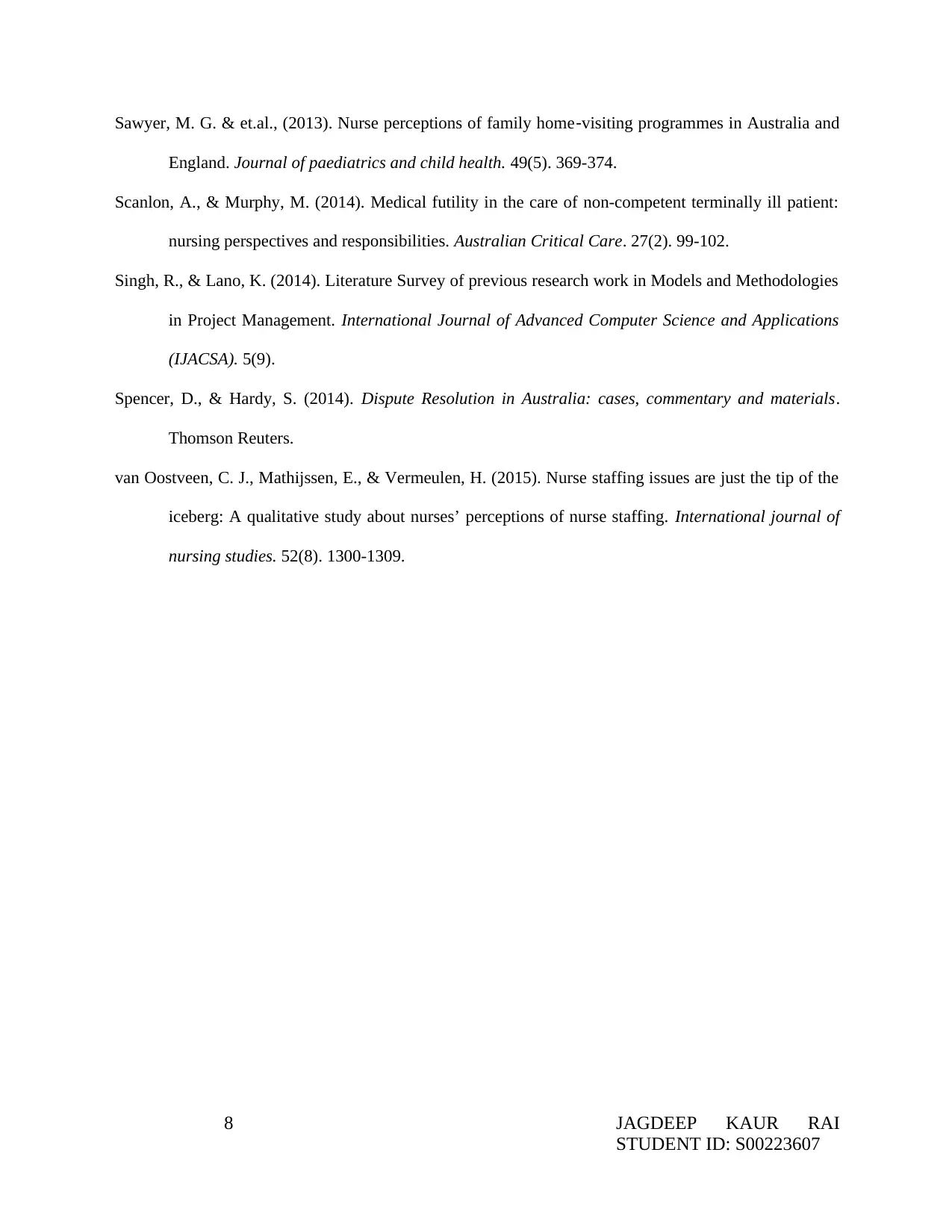
Sawyer, M. G. & et.al., (2013). Nurse perceptions of family home‐visiting programmes in Australia and
England. Journal of paediatrics and child health. 49(5). 369-374.
Scanlon, A., & Murphy, M. (2014). Medical futility in the care of non-competent terminally ill patient:
nursing perspectives and responsibilities. Australian Critical Care. 27(2). 99-102.
Singh, R., & Lano, K. (2014). Literature Survey of previous research work in Models and Methodologies
in Project Management. International Journal of Advanced Computer Science and Applications
(IJACSA). 5(9).
Spencer, D., & Hardy, S. (2014). Dispute Resolution in Australia: cases, commentary and materials.
Thomson Reuters.
van Oostveen, C. J., Mathijssen, E., & Vermeulen, H. (2015). Nurse staffing issues are just the tip of the
iceberg: A qualitative study about nurses’ perceptions of nurse staffing. International journal of
nursing studies. 52(8). 1300-1309.
8 JAGDEEP KAUR RAI
STUDENT ID: S00223607
England. Journal of paediatrics and child health. 49(5). 369-374.
Scanlon, A., & Murphy, M. (2014). Medical futility in the care of non-competent terminally ill patient:
nursing perspectives and responsibilities. Australian Critical Care. 27(2). 99-102.
Singh, R., & Lano, K. (2014). Literature Survey of previous research work in Models and Methodologies
in Project Management. International Journal of Advanced Computer Science and Applications
(IJACSA). 5(9).
Spencer, D., & Hardy, S. (2014). Dispute Resolution in Australia: cases, commentary and materials.
Thomson Reuters.
van Oostveen, C. J., Mathijssen, E., & Vermeulen, H. (2015). Nurse staffing issues are just the tip of the
iceberg: A qualitative study about nurses’ perceptions of nurse staffing. International journal of
nursing studies. 52(8). 1300-1309.
8 JAGDEEP KAUR RAI
STUDENT ID: S00223607
1 out of 10
Related Documents
Your All-in-One AI-Powered Toolkit for Academic Success.
+13062052269
info@desklib.com
Available 24*7 on WhatsApp / Email
![[object Object]](/_next/static/media/star-bottom.7253800d.svg)
Unlock your academic potential
Copyright © 2020–2026 A2Z Services. All Rights Reserved. Developed and managed by ZUCOL.





